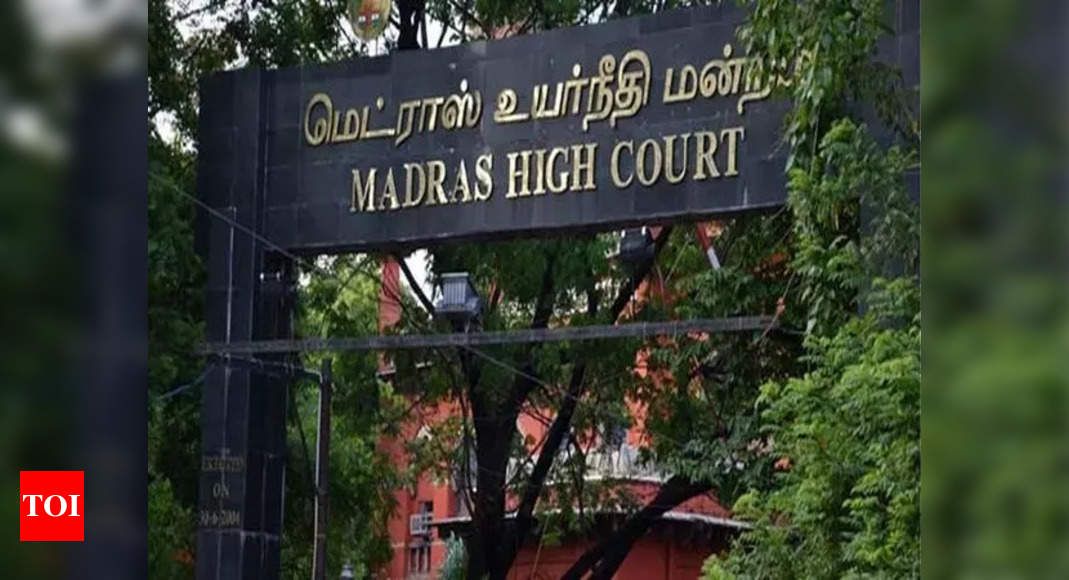[ad_1]
MADURAI: A temple is not a tourist or picnic spot, Madras high court said Tuesday, and directed Tamil Nadu’s Hindu religious and charitable endowments department to install boards at all shrines in the state mentioning that “non-Hindus are not allowed inside the temple beyond the kodimaram (flagpole)”.
The kodimaram is situated immediately after the main entrance and much before the sanctum sanctorum.
If any non-Hindu visits a temple, then the authorities shall obtain an undertaking from the person declaring that s/he had faith in the deity and would follow the customs and practices of Hindu religion and also abide by the temple’s customs. Such undertakings shall be entered in a register maintained by the temple authorities, Justice S Srimathy ruled.
The order came on a writ petition filed by D Senthilkumar to permit only Hindus to enter Dhandayudhapani Swamy Temple at Palani in Dindigul district.
The petitioner, who runs a shop on the foothills of the temple, said some non-Hindus argued with the temple authorities that it was a tourist place and it was not written anywhere that non-Hindus were not allowed.
Rejecting TN government’s request to restrict the order with respect to Palani temple alone, judge said since a larger issue had been raised, the order shall be applicable to all temples in the state. “These restrictions would ensure communal harmony among (followers of) different religions and ensure peace in society,” Justice Srimathy observed.
During the hearing, the state submitted that Lord Murugan is also worshipped by non-Hindus and they, too, follow temple customs. Being a secular state, it is the duty of government as well as the temple administration to ensure the rights of citizens under the Constitution. Prohibiting the entry of non-Hindus who have faith and belief in the deity will not only hurt their religious sentiments but also run contrary to their rights, government argued.
Rejecting the contention, the court said the authorities were worried about the sentiments of non-Hindus who do not have faith in Hinduism, but they had failed to protect the sentiments of Hindus.
The judge referred to reports about a group of non-Hindus treating Brihadeeswarar Temple in Thanjavur as a picnic spot and eating non-vegetarian food on its premises. She also cited a newspaper report that said a group of people belonging to another religion entered Meenakshi Sundareswarar Temple in Madurai with their scripture, went near the sanctum sanctorum and tried to offer prayers.
Such incidents amount to absolute interference with the fundamental rights guaranteed to Hindus under the Constitution, Justice Srimathy observed.
Watch Non-Hindus can’t enter Tamil Nadu temples: Madras High Court
The kodimaram is situated immediately after the main entrance and much before the sanctum sanctorum.
If any non-Hindu visits a temple, then the authorities shall obtain an undertaking from the person declaring that s/he had faith in the deity and would follow the customs and practices of Hindu religion and also abide by the temple’s customs. Such undertakings shall be entered in a register maintained by the temple authorities, Justice S Srimathy ruled.
The order came on a writ petition filed by D Senthilkumar to permit only Hindus to enter Dhandayudhapani Swamy Temple at Palani in Dindigul district.
The petitioner, who runs a shop on the foothills of the temple, said some non-Hindus argued with the temple authorities that it was a tourist place and it was not written anywhere that non-Hindus were not allowed.
Rejecting TN government’s request to restrict the order with respect to Palani temple alone, judge said since a larger issue had been raised, the order shall be applicable to all temples in the state. “These restrictions would ensure communal harmony among (followers of) different religions and ensure peace in society,” Justice Srimathy observed.
During the hearing, the state submitted that Lord Murugan is also worshipped by non-Hindus and they, too, follow temple customs. Being a secular state, it is the duty of government as well as the temple administration to ensure the rights of citizens under the Constitution. Prohibiting the entry of non-Hindus who have faith and belief in the deity will not only hurt their religious sentiments but also run contrary to their rights, government argued.
Rejecting the contention, the court said the authorities were worried about the sentiments of non-Hindus who do not have faith in Hinduism, but they had failed to protect the sentiments of Hindus.
The judge referred to reports about a group of non-Hindus treating Brihadeeswarar Temple in Thanjavur as a picnic spot and eating non-vegetarian food on its premises. She also cited a newspaper report that said a group of people belonging to another religion entered Meenakshi Sundareswarar Temple in Madurai with their scripture, went near the sanctum sanctorum and tried to offer prayers.
Such incidents amount to absolute interference with the fundamental rights guaranteed to Hindus under the Constitution, Justice Srimathy observed.
Watch Non-Hindus can’t enter Tamil Nadu temples: Madras High Court
[ad_2]
Source link
